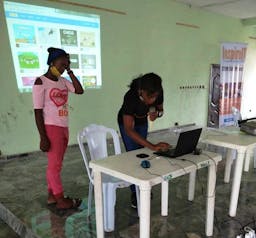Battling “Sleep with Me Before I Listen to You Syndrome” Using Mobile Technology
May 28, 2019
Story
When I approached him to discuss a business proposal, I thought he was genuinely interested in my proposal but it turned out that he had the “Sleep with me before I listen to you syndrome”.
The “Sleep with me before I listen to you syndrome” is a term I coined for men (and women) who demand for sex from an individual (who may be a young girl, young boy, man or woman) before they can be offered help, support or given jobs, contracts, awarded marks or even promoted at work. This “syndrome” is not peculiar to a certain group of people or individuals; it cuts across all races, background and sexualities.
With my experience in mentoring, I have discovered that many young girls and women find it difficult to open up and tell other people about their encounter with men who have this “syndrome” because they fear that they might be misunderstood and attacked for speaking out. I have also discovered that men (and women) with this “syndrome” can be found anywhere (churches, mosques, schools, offices, universities etc). Infact, some of them do not care whether their victim is tall, short, ugly, married or single. In some cases, they do not care about their qualifications or skills either.
We may never really be able to know the exact number of women (and men) who have been sexually assaulted and threatened by people with this “syndrome” in Nigeria. Many people are still afraid to speak out and in some cultures; it is “shameful” to openly talk about sexual assault. Sometimes the victims are blamed and the perpetrator gets away free.
Some victims of sexual assault take their cases to court but sometimes it could take almost “forever” for judgment to be passed. Many people in Nigeria do not trust the judicial system and as such, they would rather keep quiet if they have been sexually assaulted by people with this “syndrome” rather than seek for justice.
In their search for a better life and opportunities, many young girls and women come in contact with men with this “syndrome” and most of these men take advantage of their helpless situation. I remember meeting a young girl in her mid twenties who was looking for a job. Based on her education, skills and work experience, she was well qualified for the job interview that she was going to attend the day I met her. Unfortunately, the manager in charge of the company where she applied for the job had this “syndrome”. He called her into his office for the interview and after the interview; he told her that she must sleep with him if she really wanted the job. When the young girl protested, he walked her out of his office.
With the number of increasing sexual assault incidents, we do need to encourage more awareness on sexual education through mobile technology. Despite the rape incidents and other forms of sexual assault that we hear in the media as well as read online, many people are still not comfortable talking about sex education. This has led to some people calling for sex education to be included in every secondary school’s curriculum.
More women need to learn how to use mobile technology devices such as smartphones, laptops, tablets and smartwatch to their advantage especially in reporting uncomfortable and dangerous situations.
I also do encourage women to learn how to download and install mobile applications on their phones. Personal safety apps such as Circle of 6 (free for iOS and Android devices) lets you build a circle of six friends or trusted people to quickly call on when you're in danger and need help, in a bad situation with someone else, or need to reach the authorities. With one touch, the app pings your trusted friends or emergency services with your request for help, along with your current location so they can find you.




